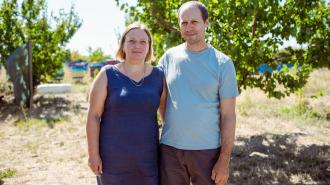The teacher beekeeper from the Nistru bank
August 16, 2024

Seven years ago, Valentina Rotaru, a teacher from Socola village, Șoldănești district, a locality of just 200 inhabitants on the banks of the Nistru River, started her beekeeping adventure.
"The school was reorganized, the teachers were transferred to the school in the neighboring village. There I had few hours and a little salary. My husband didn't have a stable job, it was hard. We tried to grow vegetables, but after the first year of work we had nobody to sell our produce and it all spoiled in the fields. Then my husband started to make wooden barrels, but this was more seasonal and we still didn't have enough money for the whole year," remembers the beekeeper.
Valentina's husband's grandfather was a beekeeper. He taught him beekeeping techniques, so they decided to try beekeeping. To start the bee business, they needed a big investment, which the family didn't have.
"Some friends, who had been beekeeping for almost 20 years, helped us. They gave us wings. They gave us some families of bees and a few old hives. Then, in just one year, the husband made more than 50 hives, and in the second – 70. Today we have over 180 bee hives," says Valentina.
Year after year, with a steady income, the family reinvested the money they earned, but sales started to decline during the pandemic and then with the energy crisis, aggravated by the war in Ukraine.
With the help of the Austrian Development Agency and UNDP Moldova, she was able to install solar panels at her business and significantly reduce her electricity costs. The 6 kW photovoltaic system, for which she obtained support, will cover her electricity consumption at the factory where she produces organic wooden beehives, beehive sheds and frames.


"We obtained this support at a very difficult time for our business. We are happy that these panels will reduce our electricity costs.”Valentina
Last year beekeepers obtained a rich harvest - more than six tons of polyflower, acacia, rapeseed, may and sunflower honey. The largest amount was sold wholesale and one ton was sold through social media.

 Locations
Locations













